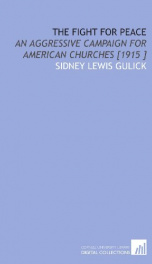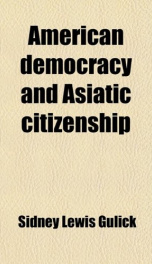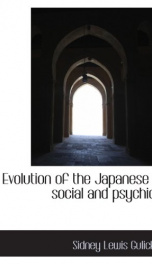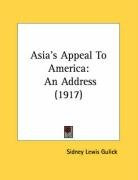Gulick Sidney Lewis

Rev. Dr. Sidney Lewis Gulick (April 10, 1860-December 20, 1945) was an educator, author, and missionary who spent much of his life working to promote greater understanding and friendship between Japanese and American cultures. Gulick was born in Ebon, Marshall Islands, the son of Luther Halsey Gulick Sr., a missionary, and Louisa Lewis Gulick. He is also the brother of Luther Halsey Gulick Jr. He received an A.B. degree from Dartmouth College in 1883, an A.M. degree in 1886 and a D.D. degree in 1903. He also held D.D. degrees from Yale and Oberlin College. He was ordained a Congregational minister in 1886, and then was a supply minister at the Willoughby Avenue Mission, Brooklyn. In 1888 Gulick traveled to Japan, where he would work as a missionary of the American Board of Commissioners for Foreign Missions for the following twenty-five years. He mastered the Japanese language, fluently giving sermons and writing books in it. He taught English, science, and religion at several schools and universities in Japan. In his last seven years there, he served as Professor of Theology at Doshisha University in Kyoto and as lecturer at the Kyoto Imperial University. After returning to the United States in 1913, Gulick was dismayed to find growing discrimination and resentment against Japanese Americans. He campaigned against California's anti-Asian legislation and urged equality of treatment for all nations. An ardent worker in the cause of world peace, he was a vigorous proponent of the entry of the United States into the World Court. After passage of the Immigration Act of 1924, which virtually halted immigration to the U.S. from countries seen as "undesirable", Gulick decided that the most productive way to encourage international understanding was through children. Gulick was instrumental in forming a group called the "Committee on World Friendship Among Children". In 1927, its first project was to organize the sending of American dolls to Japan for Hinamatsuri, an annual doll festival. This project had an overwhelming response from the American public, and altogether, 12,739 of these "American Blue-eyed Dolls" were sent to Japanese schools, each with an accompanying letter professing friendship. The Japanese later sent 58 dolls back to the United States- one for each state, plus more for states with larger populations. These Japanese friendship dolls were around three feet high, and were dressed in traditional Japanese clothing. They came with a trunk full of their belongings including equipment for the tea ceremony. After these dolls toured the United States, they went back to their state. During World War II, many of the dolls, especially the ones in Japan, were seen as the enemy and were burned or stabbed. Many people saved dolls by hiding them until the war was over. Gulick was the author of many books about Japanese-American relations. He died in Boise, Idaho, at eighty-five years of age. "We who desire peace must write it in the hearts of children."--Sidney L. Gulick
do you like this author?
What readers are saying
What do you think? Write your own comment on this book!
write a commentWhat readers are saying
What do you think? Write your own comment on this author!
write a commentBook list

the white peril in the far east an interpretation of the significance of the ru
Series:
Unknown
Year:
Unknown
Raiting:
4/5
Show more
add to favoritesadd In favorites

the fight for peace an aggressive campaign for american churches
Series:
Unknown
Year:
Unknown
Raiting:
5/5
Originally published in 1915. This volume from the Cornell University Library's print collections was scanned on an APT BookScan and converted to JPG 2000 format by Kirtas Technologies. All titles scanned cover to cover and pages may include marks notations and other marginalia present in the original volume.
Show more
add to favoritesadd In favorites
Book list

the white peril in the far east an interpretation of the significance of the ru
Series:
Unknown
Year:
Unknown
Raiting:
4/5
Show more
add to favoritesadd In favorites

the fight for peace an aggressive campaign for american churches
Series:
Unknown
Year:
Unknown
Raiting:
5/5
Originally published in 1915. This volume from the Cornell University Library's print collections was scanned on an APT BookScan and converted to JPG 2000 format by Kirtas Technologies. All titles scanned cover to cover and pages may include marks notations and other marginalia present in the original volume.
Show more
add to favoritesadd In favorites

the american japanese problem a study of the racial relations of the east and t
Series:
Unknown
Year:
Unknown
Raiting:
4/5
Show more
add to favoritesadd In favorites

anti japanese war scare stories by sidney l gulick
Series:
Unknown
Year:
Unknown
Raiting:
4/5
Show more
add to favoritesadd In favorites

american democracy and asiatic citizenship
Series:
Unknown
Year:
Unknown
Raiting:
5/5
Purchase of this book includes free trial access to www.million-books.com where you can read more than a million books for free. This is an OCR edition with typos. Excerpt from book: CHAPTER H JAPAN: HER PROBLEMS AND CLAIMS Japan's entrance into the life of the world and acceptance of the civilization of the West has not been to her an unmixed blessing. In important respects her problems have become more intense. Her modern system of universal education giving world outlook, ideals, and ambitions to millions of her young men and women; her extraordinary industrial development and international trade bringing wealth and a higher scale of life to millions, but also bringing grinding toil, poverty, disease, and wretchedness to other millions; her new political system giving responsibility for national as well as for local government and causing the entire nation to consider and decide upon international relations and policies; her new ideals as to the value and rights of the individual begetting throughout the nation a spirit of insistence on rights and a forgetting of the importance of service and the necessity of duty; her modern hygiene and her medical and surgical efficiency giving remarkable success in battling with epidemics no less than with the regular diseases, and making possible a lower death-rate and a longer average of lifethese many blessings have brought also many new problems. The full discussion of these problems, however, is no part of our plan. We need to consider them only so far as they throw light on the character of the policy which America should adopt in her dealings with Japan. Japan's old policy kept her people at home, almost stationary in numbers and relatively docile and contented. Her new policy opens their eyes to the great world, gives them efficiency in dealing with it, multiplies her millions and fires them with ambition both personal and national. Mighty economic and psychological forces are at work sweeping the enti...
Show more
add to favoritesadd In favorites

Evolution Of The Japanese, Social And Psychic
Series:
Unknown
Year:
Unknown
Raiting:
3/5
Purchase of this book includes free trial access to www.million-books.com where you can read more than a million books for free. This is an OCR edition with typos. Excerpt from book: H i HISTORICAL SKETCH OW many of the stories of the Kojiki (written in 712 A. D.) and Nihongi (720 A. D.) are to be accepted is still a matter of dispute among scholars. Certain it is, however, that Japanese early history is veiled in a mythology which seems to center' about three pirormnent points: 'Kyushu, in the south; " 'YamatO. in tllf fait rcntral, anrl jmin injjip west CCn- traj fpginn This mythological history narraTes the cirj " Tcumstances of the victory of the southern descendants Vof. .thegculs over the two central regions. And it has Hjeen conjectured that these three centers represent three waves of migration that brought the ancestors of , the present inhabitants of Japan to these shores. The ' supposition is that they came quite independently- and began their conflicts only after long periods of residence and multiplication. Though this early record is largely mythological, tradition shows us the progenitors of the modern Japanese people as conquerors from the west and south who drove the aborigines before them and gradually took possession of the entire land. That these conquerors were not all of the same stock is proved by the physical appearance of the Japanese to-day, and by their language. Through these the student traces an early mixture of races the Malay, the Mongolian, and the Ural-Altaic. Whether the early crossing of these races bears vital relation to the plasticity of the Japanese is a question which tempts the scholar. Primitive, inter-tribal conflicts of which we have no reliable records resulted in increasing intercourse. Victory was followed by federation. And through the development of a common language, of common customs and common ideas, the tribes were unified socially,and psychically. Consciousness of this unity was emp... --This text refers to an alternate Paperback edition.
Show more
add to favoritesadd In favorites
What readers are saying
What do you think? Write your own comment on this author!
write a commentif you like Gulick Sidney Lewis try:
readers also enjoyed
What readers are saying
What do you think? Write your own comment on this author!
write a commentGenre
if you like Gulick Sidney Lewis try:
readers also enjoyed
Do you want to read a book that interests you? It’s EASY!
Create an account and send a request for reading to other users on the Webpage of the book!


